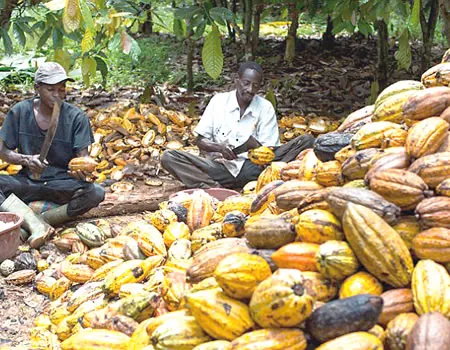



With the reality of the need to diversify the economy dawning day by day, it is clear that the country still has an opportunity in cocoa farming, as the cash crop remains its second major non-oil foreign exchange earner for the country. Nigeria is currently the fourth largest cocoa producer coming after two African countries and Indonesia, but experts believe that this can be improved upon with renewed government interest and commitment.
This view would explain the position of the Project Manager of the Olakoko Sustainability Project, Mrs. Mopelola Fabunmi, that farmers in the country require more support in order for them to apply global best practices in their operations. She added that Nigeria “is in a pole position to increase its yield of cocoa and to ensure improved quality of cocoa produce as well as improve the quality of lives of farmers.”
Fabunmi stated these during the commemoration of Farmers’ Day held at Igbara-Oke, Akure, attended by dignitaries from the Federal Ministry of Agriculture and Rural Development, Cocoa Research Institute (CRIN), project partners from Agrilogic, Sucden (Paris and Nigeria), Starlink and a total of 2,851 farmers from Edo, Osun, Ogun, and Ondo states.
The Olaloko Sustainability Project is an outfit with the objective of training farmers how to take care of the farms with a view to improving cocoa yields as well as training the farmers on how they and their family members can live good and economically sustainable lives, especially during cocoa off-seasons.
Fabunmi stated that in over two years of its operation, the Olakoko Project has trained more than 8,000 farmers from Edo, Ogun, Osun and Ondo States, saying: “We do not relent in our efforts at ensuring that farmers are thoroughly trained on farm practices and passing necessary information required to improve agricultural yields.
“One of the aims of the project is to ensure that farmers take good care of their farms, (fruits and soil) so as to get good quality cocoa beans there. We do this by linking them to sources of good inputs such as fungicide, insecticide, herbicides and so on, which are approved by authorised bodies such as CRIN. We also encourage diversification of other crops during the cocoa off-season.
The lawyers described Ahmed's actions as a clear abuse of office, a betrayal of the…
Students of Adekunle Ajasin University, Akungba-Akoko (AAUA), in Ondo State, have raised the alarm over…
“The ADC has no preferred or favorite presidential aspirant, but..."
Lagos State House of Assembly has expressed intention to improve the status of the current…
The African Democratic Congress (ADC) has kicked against the lawsuit filed by some individuals against…
More appropriately, eat appropriately, exercise, and ensure that you monitor your blood pressure, you go…
This website uses cookies.